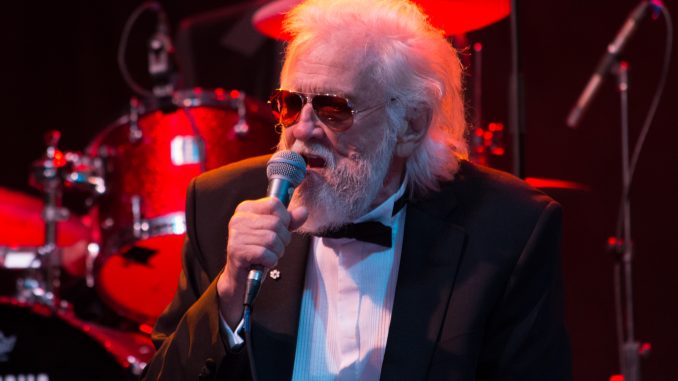
Americana would not be the genre we have today without “The Hawk”.
Legendary is an oft-misused term, particularly when applied to musicians, but it fits perfectly with Ronnie “The Hawk” Hawkins, a musician who was born two days after Elvis Presley on 10th January 1935, in Huntsville, Arkansas and who died on 29th May after a long illness. Ronnie Hawkins isn’t a member of the Rock and Roll Hall of Fame, and he never did achieve significant record sales even in his heyday, so why is he such a legendary musician? The answer is very simple, he virtually singlehandedly kickstarted the Canadian music scene in the late ‘50s and he was a great mentor, teacher, and bandleader for the musicians who backed him, and some of those musicians joined Bob Dylan when he was looking for a backing band for his first US electric tour in 1965, and subsequently established their own career as The Band, changing the course of music in general and in the process laying the bedrock of americana.
Ronnie Hawkins was part of the first generation of rockabilly artists and formed the first version of his backing band, The Hawks with a certain Levon Helm on drums, while at The University of Arkansas in 1957. He auditioned unsuccessfully for Sun Records in 1958 and started touring Canada in the same year following a suggestion by Conway Twitty. He maintained his reputation for wild live shows that had earned him the nickname “Mr. Dynamo” when he toured Canada, and when his American musicians, with the exception of Helm, left him to return to America, he recruited Canadian musicians Robbie Robertson, Richard Manuel, Rick Danko, and Garth Hudson to replace them. Hawkins schooled his musicians well, often having all-night rehearsals after a performance, and this and the experience the Hawks got recording for Roulette Records laid the foundation for the music of The Band. Hawkins’ music was steeped in the style of first-generation rockabilly artists, and his repertoire comprised largely of covers. His Roulette Records were reasonably successful at the time, with the most successful being ‘The Folk Ballads Of Ronnie Hawkins’ which was a nod to the then current Folk Revival. By 1963 The Hawks were regarded as one of the best bands working in Canada, and it was this success and the restrictive nature of Ronnie Hawkins’ style that prompted the Hawks to leave Hawkins to try and develop their own career. And the rest, as they say, is history.
Ronnie Hawkins didn’t record from the end of his Roulette Records contract in 1964 until his two-album deal with Atlantic subsidiary label Cotillion in 1970. By this time Hawkins was basking in the reflected glory of his association with The Band and he recorded with the cream of Muscle Shoals musicians, including Duane Allman, and Jim Dickinson’s Dixie Flyers with producers Jerry Wexler and Tom Dowd. Apart from the backing musicians, the music wasn’t very different from his roulette records, though he did include covers by contemporary writers such as Gordon Lightfoot, Bob Dylan, Jerry Jeff Walker, and Tim Hardin. Both Cotillion records, ‘Ronnie Hawkins’ and ‘The Hawk’ received positive reviews but didn’t really find an audience at the start of the ‘70s which a move to Monument Records for another two-album deal did little to alter. Ronnie Hawkins was featured in The Band’s ‘The Last Waltz’ and this resulted in his last deal with a major label that saw the release of 1979’s ‘The Hawk’ on United Artists. The album followed a similar template to his Cotillion albums, but this time the contemporary sound hinted at was rootsy new wave music and what every the merits of the recording, it again did not find a significant audience. He continued to record in the ‘80s with 1984’s ‘Making It Again’ winning a Juno Award. In 1975 Ronnie Hawkins was cast to play Bob Dylan by Dylan himself, in his ‘Renaldo and Clara’, which helped him establish a second career as an actor. He was inducted into The Canadian Music Industry Hall Of Fame and the Rockabilly Hall Of Fame which is clear recognition of his musical achievements.
Dylan would not be Dylan without his groundbreaking electric tours of the mid-’60s with The Band, and can anyone imagine rock music and americana without ‘Music From Big Pink’ and ‘The Band’. These musically earth-shattering events would not have happened without the involvement of Ronnie Hawkins who represented the heart and soul of roots American music and schooled and trained the future members of The Band in this timeless music, and he singlehandedly sowed the seeds for the vibrant Canadian music scene that has brought so much great music to the world. Truly legendary achievements in themselves, and his own music represented the best of roots rock, particularly with his renowned live performances, and whenever he went into the studio to record, even if he never found a significant audience outside of Canada for his own music.



Goodbye Ronnie. I’d say sleep peacefully , but that aint never been your way ! Shake ’em up, up there fella.
As you say Andy, a true one-off